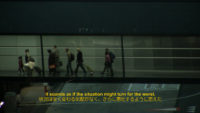
24 July – 9 Aug, 2019
25 Aug – 6 Sep, 2019
Opening reception: 17.00-19.00 on 24 July
Opening hours: Mon.- Fri. 12.00-19.00
Sat.&Sun. 12.00-17.00
We are pleased to announce the solo show of Yosninori NIWA (b.1982) “The Communities We Must Have Imagined” from July 24.
It is said that people are motivated by their emotions and by money, but the specific mechanisms involved are greatly influenced by values imprinted on each individual during the process of growth. Until just recently, it was widely accepted that video was a tool for capturing reality and conveying the truth, but advances in technology have swiftly undermined this assumption. However, people retain an undeniable desire to believe that the moving image is, in fact, reality. Nowadays, there is scarcely a news or media outlet free from sources and information that have been altered, fabricated, and disseminated in line with the broadcaster’s interests, but a world where we must doubt the veracity of everything we see, hear, and read only exhausts its inhabitants. It has come to seem that the problems caused by this “fake news” are not limited to societal chaos and political manipulation by those in power, but may even lead to collapse of “reason,” on which the survival of human civilization depends.
When photographic technology was imported from Europe to Japan, as the country opened to the world at the end of the Edo Period (1603-1868), people reacted in various ways. Those astounded by this unfamiliar technology believed all sorts of things, and there were widespread unfounded rumors that the photographic subject’s soul would be sucked out, or his or her hands would grow larger. The latter is evidently the reason that in many extant photographs from this era, people have their hands drawn inside their sleeves. Today this just seems like a joke, but it also shows how people seek to protect the rationality of the world they know by devising explanations of unfamiliar technologies, and how encounters with these new technologies create opportunities for thought. However, in contemporary society, people are so accustomed to new technologies appearing one after another that they have lost this ability to use their wits. This exhibition reconsiders fake news, a contemporary problem intrinsic to the moving image, from a critical standpoint, and explores its psychological effects.
Many of Niwa Yoshinori’s works take the form of social interventions spanning diverse media, including performance, film, installations, and projects that progress during the exhibition. The clearly stated titles of works are slogan-like and self-explanatory, and in most cases, the entire process of carrying out unproductive and meaningless actions in public spaces is documented on film. By exposing various disturbances generated in the course of putting the work’s title into practice, the artist has revealed the boundaries and limitations of the “public” concept in numerous projects in Japan and abroad. In 2016 Niwa moved his base of operations to the Austrian capital of Vienna, and has been focusing on the social functions of visual media. The current exhibition deals with the Tokyo Olympics approaching in 2020, and comprises a group of works centered on a fake documentary Niwa is producing from 2017 until just before the Olympics. The premise is that “The Communities We Must Have Imagined”
The work turns its attention to the Games’ enthusiastic welcome from the business community, based on the dramatic postwar economic growth that accompanied, or coincided with, the 1964 Tokyo Olympics. However, after a series of historic national crises, the radioactive contamination from the Fukushima nuclear meltdown, and immigration-related issues accompanying internationalization, it is clear that Japan’s situation has changed since then. In this project, Niwa edits together film addressing the Olympics from various perspectives, including interviews with athletes and team managers in the context of the 2020 Tokyo Olympics, archival footage of the 1964 Games, and political speeches by Prime Minister Abe, to create a fictional future documentary with a premise that nobody believes possible: a boycott of all events by Japanese athletes. By creating discrepancies between the video’s overall narrative content and statements made by those appearing in it, the work provokes thought on what ideologies are linked to the future we expect or hope for, what generates this future, and whether it truly reflects the future we anticipated, while re-examining the modern history of postwar Japan thus far.
Yoshinori NIWA artist page